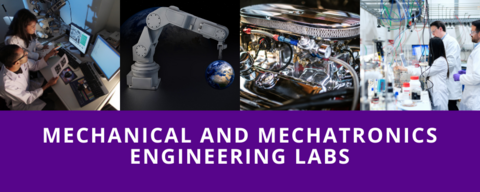
- Our research labs have strong industry, business, and government partners. If you are interested in partnering with a specific lab, please reach out to the contacts listed below.
- If you are looking for available positions, please see the specific lab’s available position links for details.
Mechanical and Mechatronics Engineering Labs
5-Axis Surface Machining Lab (MachLab)

The machining lab is designed to conduct research into 5-axis machining. 5-axis machines are becoming increasingly popular in the industry but the techniques required to take advantage of the additional flexibility of these machines are still in their infancy. Here at Waterloo, we have focused our effort into developing tool-positioning strategies that take advantage of the ability of 5-axis machines. In addition, we also have interests in NC machine and controller design, and in mechanistic modeling.
Key Research Topics: 5-axis Surface Machining, Flank Milling, Tool Positioning Methods, CNC Controller Design, Tool Path Planning, Live Model-based Controller, Paradigms for 5-axis Machining, Complex Curve Machining Methods: Principle Axis Method (PAM) and Multi-Point Method (MPM)
Contact: Sanjeev Bedi, Professor, NSERC Chair, Director of Ideas Clinic
Active and Interactive Robotics Lab (A.I.R. Lab)

We are interested in understanding how humans interact with robots, and how to improve robot control with respect to diverse interaction scenarios. We analyze the interaction from physical aspects (e.g. maintaining physical safety and user ergonomics) and social aspects (e.g. perception, acceptance, ethics). In particular, we are interested in using these aspects within the control of the robots so that they can perform their tasks actively and efficiently, while being socially acceptable.
Key Research Topics: Interface, modeling, and control of MECA500 R3, Active Physical Human-Robot Interaction, Telepresence for Walking and Manipulation of Humanoid Robots, Modeling and Control of the Heicub Humanoid Robot with SEA, Walking of the ICUB Humanoid Robot, Modeling and Analysis of Compliance During Human Walking
Contact: Yue Hu, Assistant Professor
Arami Research Lab (Neuromechanics and Assistive Robotics)

We use Machine Learning Techniques, System Identification and Mathematical Models to understand the neural control of our movements and our neuromechanics. Using identified neuromechanics, control theory, and recent findings in the field of human motor control and movement neuroscience, we design assistive controllers for robotic systems that will assist humans. Machine Learning techniques are used in our robotic system control We benefit from wearable systems and in-field movement analysis to evaluate assistive and rehabilitation robotic systems.
Key Research Topics: Assistive Robotics, Human-Robot Interaction, Rehabilitation Engineering, Neuromechanics and Sensorimotor Modelling, Neural Control of Movements, Intelligent Systems, Wearable Systems, System ID
Contact: Arash Arami, Assistant Professor and AramiLab Director Follow on Twitter: @Arash_Arami
Centre for Advanced Materials Joining (CAMJ)

The primary goal of the Centre for Advanced Materials Joining (CAMJ) at the University of Waterloo is to develop new and innovative technologies for materials joining. CAMJ has cutting-edge laboratory facilities and research areas to collaborate with leading companies in the industry for research and development. CAMJ trains students on the undergraduate, Masters, PhD, and Post Doctoral levels and collaborates with students from foreign institutes of excellence to extend their research.
Key Research Topics: Microwelding, Microjoining, Nanojoining, Laser, arc, resistance and friction stir welding
Contact: Norman Zhou, Professor and Director of the Centre for Advanced Materials Joining
Composites Research Group (CRG)

The Composites Research Group (CRG) consists of a dynamic team of dedicated researchers. Applied and fundamental research is conducted in many areas related to high-performance lightweight composite materials and structures, including processing of fiber-reinforced plastics (FRP), assessing multi-scale material constitutive behaviour, fracture and damage mechanics, impact and crashworthiness, fatigue and long-term durability. Our research is applicable in many sectors, including automotive, aerospace and wind energy.
Key Research Topics: Manufacturing and process simulation, Material Characterization, Multi-scale Modeling, Constitutive Modeling, Impact and crashworthiness, Fatigue and longterm durability, Multi-material FRP/metalic structures, Bio-inspired composites.
Contact: John Montesano, Professor and Director of the Composites Research Group
Computational Mechanics Research Group (CMRG)

At the Computational Mechanics Research Group, we believe that unlocking the mysteries of a material’s microstructure is key for advancing its implementation in industry. We accomplish this by developing novel phenomenological and crystal plasticity simulation tools that account for microstructural phenomenon during large deformation. Our group’s area of focus is on the research and development of micromechanics, synthetic microstructure construction, multi-scale modeling, failure and fracture, crashworthiness and formability.
Key Research Topics: Crashworthiness, Formability, Fracture, Microstructure Building, Micromechanics Modeling, Multiscale Modeling
Contact: Kaan Inal, NSERC General Motors Industrial Research Chair, Professor, Principal Investigator Computational Mechanics Research Group
Cooperative & Adaptive Mechatronic Systems Lab

Cooperative & Adaptive Mechatronic Systems Lab studies cooperative and adaptive approaches to control, optimization, and parametric identification of dynamic mechatronic systems. Ongoing projects focus on distributed motion planning and coordination of mobile robot and autonomous vehicle networks, adaptive and learning based motion planning and maneuver control for collaborative driving and intelligent transportation, distributed parameter identification and adaptive control of intelligent vehicle systems and mobile robotic platforms, localization and mapping via autonomous vehicle networks, UAV navigation and stability control, filtering and control design for biomedical and human assistive robotic applications.
Key Research Topics: System identification and adaptive control, autonomous vehicle navigation control and coordination, cooperative target localization and tracking, terrain surveillance and mapping, robotic motion and service coverage planning.
Contact: Baris Fidan, Principal Investigator, Professor.
Fatigue and Stress Analysis Lab

Fatigue is the process of progressive localized permanent change occurring in a material subjected to cyclic stresses and strains at some points which may result in crack nucleation and growth to final failure after a sufficient number of fluctuations. Alternations of stress and/or strains are difficult to avoid in many practical engineering situations and are very important in design. In many components, such as alternating stresses and/or strains are applied in a multiaxial manner with a variety of load path patterns including in-and-out-of-phase. This interest has a broad range including automotive, aerospace, off shore structures, power generation, and microelectronics industries. Fatigue characterization, modeling and life enhancement. The study and development of robust and efficient methods for durability analysis and their applications to CAE design. Member of the Advanced Manufacturing Consortium.
Key Research Topics: Multiaxial fatigue of emerging light materials, durability of advanced joining, soilid state additive manufacturing, cold spray coating, cyclic plasticity modeling of wrought alloys.
Contact: Hamid Jahed, Lab Director, Professor
University of Waterloo Fire Research Group

The University of Waterloo Fire Research Group is internationally respected for its excellence in fire research and fire safety education.
As such, we build effective partnerships with other universities, fire safety professionals, fire safety-related industries, and organizations. We provide education and research for professionals in fire safety-related industries and organizations, undergraduate and postgraduate students, municipal fire service, and military personnel. Through these partnerships and collaborations, the Fire Research Group is advancing fire safety through fire-related research and testing.
Visit their research areas page for more information about ongoing and recently completed areas of research activity.
Key Research Topics: Fire dynamics, industrial fire safety, diagnostics, fire services, transportation, fire modeling and risk analysis.
Contact: Vinny Gupta, Assistant Professor
Forming and Crash Lab

The Forming and Crash Lab studies the behavior of light-weight materials and structures during the manufacturing process and collision events. Experiments ranging from constitutive and fracture characterization of advanced materials through large-scale crash testing are underway, in support of computer simulations of manufacturing and vehicle safety. The goal is to apply these results to make the next-generation of automobiles lighter yet safer for passengers. In addition to making cars safer, the lab seeks to improve fuel economy and reduce greenhouse gas emissions as a result of a lighter vehicle.
Key Research Topics: Joint/Structural Crashworthiness, Modelling of Structural Components, High Temperature Formability, Fracture Characterization, High Strain Material Behavior
Contact: Clifford Butcher, Associate Professor and Director of the Forming and Crash Lab
Fluid Mechanics Research Laboratory

Our research is focused on fluid mechanics and its multidisciplinary applications in engineering and science. Please browse our website to find out more about our research interests, experimental facilities, research team, collaborators, and current research opportunities.
Key Research Topics: Our research is concerned with fluid phenomena occurring in a wide range of important engineering applications, including wind turbines, micro air vehicles, aircraft, heat exchangers, and civil structures.
Contact: Serhiy Yarusevych, Principal Investigator, Professor
Functional Nanomaterials for Sustainability and Health

Our research focuses on the development of functional nanomaterials for a variety of applications, with a particular emphasis on sustainability and health. Materials of interest include nanostructured metal oxides, nanoparticles of 2D materials, and metal halide perovskites, among others.
Key Research Topics: Developing scalable manufacturing processes for nanomaterials, including new spatial atomic layer deposition techniques. Improving the stability of next-generation devices, such as perovskite photovoltaics, developing 2D materials for chemical sensing of toxic heavy metal pollutants, developing 2D materials for cancer imaging and therapy, and integrating combinatorial approaches and machine learning into the development of nanomaterial. The Functional Nanomaterials Group is located within the Department of Mechanical and Mechatronics Engineering, and makes extensive use of state-of-the art nanotechnology facilities at the University of Waterloo, including the Giga-to-Nanoelectronics Centre, the Quantum-Nano Centre, and the Waterloo Advanced Technology Laboratory. Located in southwestern Ontario, the University of Waterloo has been ranked the most innovative university in Canada more than 20 years in a row.
Contact: Kevin Musselman, Assistant Professor and Group Leader
Greener Productions

The group combines expertise in thermal science, material engineering and techno-economics to develop sustainable technologies for energy conversion and chemical production (e.g., hydrogen production, CO2 capture and utilization, biomass and hydrocarbon valorization). Both experimental and numerical methods will be applied to develop a fundamental understanding of the thermodynamics and kinetics. Thermo-electro-chemical processes are of interest to maximize system versatility. The kinetics and reaction mechanisms can be obtained from high throughput benchtop reactors and physical models. System-scaled numerical analysis will be used to investigate the optimal operating conditions and the energy-chemical integration. Techno-economics analysis will also be explored to evaluate the costs. These findings will accelerate the material development and process optimization and facilitate the commercialization of these technologies. The goal is to utilize renewable resources and improve global living standards.
Key Research Topics: Flexible hybrid energy storage system, cleaner hydrogen production, chemicals with smaller footprints, and cooling with higher efficiency.
Contact: XiaoYu Wu, Principal Investigator, Assistant Professor
Impact Mechanics and Material Characterization Group
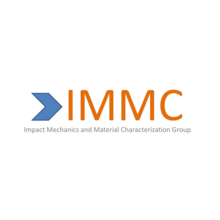
The Impact Mechanics and Material Characterization Group undertakes leading computational modeling and experimental testing, bridging the gap between these two important disciplines with advanced high deformation rate material characterization and constitutive modeling. Computer Aided Engineering (CAE) and High Performance Computing (HPC) have been identified as critical elements in innovation and achieving reduced design cycle times, saving millions of dollars in development costs. A key enabler for advanced modeling is the ability to test materials, develop and implement in appropriate constitutive models, and integrate into the CAE environment.
Key Research Topics: Multiaxial fatigue of emerging light materials, durability of advanced joining, soilid state additive manufacturing, cold spray coating, cyclic plasticity modeling of wrought alloys.
Contact: Duane Cronin, Professor, Lab Director, Tier 1 Canada Research Chair in Trauma Biomechanics and Injury Prevention
Waterloo Laboratory for Inverse Analysis and Thermal Sciences (WatLIT)

My research group studies inverse problems that arise in combustion and heat transfer, including laser-based nanoparticle metrology, optical tomography, and design optimization of combustion devices and industrial furnaces.
Key Research Topics: Inverse analysis and optimal design of heat transfer systems, thermal radiation heat transfer, laser-based combustion diagnostics, molecular gas dynamics
Contact: Kyle J Daun, Professor
Kwon's Research Group

Welcome to AI Ultrasonics lab. Our aims are to apply AI to non-invasive and non-destructive methodologies for imaging, testing and treatment. Machine Learning and Robotics are essential tools to achieve the aims. We have diverse research areas ranging from Ultrasonic Imaging, Non-destructive Testing (NDT), Laser Ultrasonics, High-Intensity Focused Ultrasound (HIFU) and Elastography. We also perform System Design and Integration to automate the imaging and testing processes.
Key Research Topics: High intensity focused ultrasound (HIFU), non-destructive testing (NDT), elastography, biomechanics (cell traction force measurements), fatigue and fracture.
Contact: Hyock-Ju Kwon, Principal Investigator, Associate Professor
Laboratory for Emerging Energy Research
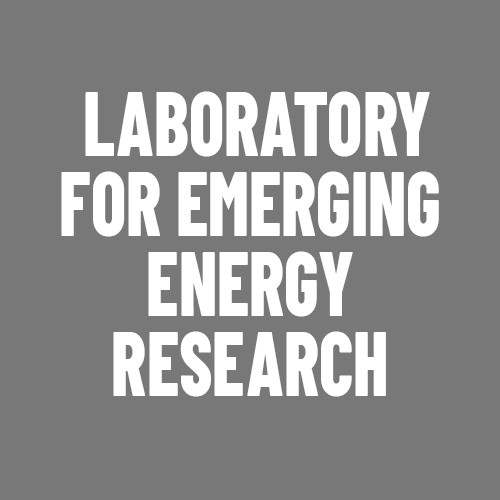
The Waterloo Laboratory for Emerging Energy Research explores potential solutions to energy security and global warming. We focus on not only revisiting the existing technologies for energy conversion and management but developing novel methods by means of applied nanotechnology and multi-disciplinary approaches. For example, we have studied combustion processes of biofuels which are modified by plasma fields or nano-catalysts. We also make novel nanostructures (nanoparticles, nanowires and nanotubes) and investigate their applications in energy production and storage. We have been greatly motivated by developing applied environmental and nanomaterial-based technologies and closely engaged with industrial partners in commercializing them.
Key Research Topics: Emerging and sustainable energy conversion technologies, nanostructured energy conversion and storage devices, engineered nanocatalyst for NOx reduction, nanothermite synthesis and applications, smart energy network (optimization and control)
Contact: John Z. Wen, Principal Investigator, Professor
Maglev Microrobotics Laboratory

Maglev Microrobotics Laboratory studies the design and development of magnetically levitated (Maglev) robots. To accomplish this, a magnetic levitation setup enabling high precision 3D remote positioning was built. We are working on the development and industrialization of various applications of magnetism such as electromagnetic energy harvesters and non-destructive testing for detecting cracks and defects in live pipelines.
Key Research Topics: Contactless micromanipulation and microrobotics, manipulation in hazardous environment, clean rooms applications, wind tunnel testing, wafer growth and wafer transportation.
Contact: Behrad Khamesee, Professor, Director
Materials Interface Foundry

MIF focuses on research, design, and advanced manufacturing of novel materials interfaces for energy, climate, and electronics. MIF is most well-known for its groundbreaking work creating the first 'artificial leaf' that turns carbon into fuel which converts harmful carbon dioxide into useful alternative fuel.
Key Research Topics: Climate and environment research, sensing research, computing
Contact: Yimin A Wu, Assistant Professor
Mechatronic Vehicle Systems Lab

Vehicle electrification is the most promising road transportation solution to these new standards. However, electrification of vehicle systems presents difficult challenges that cannot be resolved using only the established conventional vehicle technologies. These challenges are related specifically to: powertrains, chassis design and layout, multidisciplinary power management and optimization, system integration, vehicle dynamics and stability.
Key Research Topics: Active vehicle control and estimation, new technologies for urban vehicles, anti-idling for service vehicles, variable valve timing systems and air hybrid engines, active and adaptive suspensions, smart tires.
Contact: Amir Khajepour, Lab Director, Professor, Canada Research Chair in Mechatronic Vehicle
Micro Nano-Scale Transport Lab (MNT Lab)
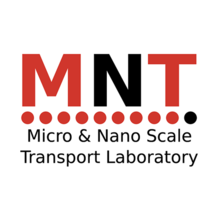
The laboratory has state-of-art facilities to conduct fundamental studies related to fluid transport processes which are occurring at micro and nano-scale with applications in key areas of energy, environment monitoring, and bio-systems.
Key Research Topics: Under-water drop dynamics, superhydrophobic/superoleophobic surfaces, capillarity and surface tension, study of droplet coalescence, understanding ion transport in narrow confinements.
Contact: Sushanta K. Mitra, Lab Director, Professor
Microelectronics Heat Transfer Laboratory

The Microelectronics Heat Transfer Laboratory (MHTL) has a history going back to 1984 when a small research group within the Department of Mechanical Engineering was assembled to work on heat transfer projects for the telecommunications sector, most notably Bell Northern Research and Northern Telecom (later Nortel). Since its inception, the MHTL has collaborated with many of the leading microelectronics companies in North America, including IBM, Motorola, Siemens, Alcatel, to name a few.
Key Research Topics: Evaluation and modeling of next generation electronics cooling technologies, air cooled electronics, experimental and analytical analysis of micro-channel heat exchangers, effective thermal conductivity of composite thermal interface materials.
Contact: Richard Culham, Lab Director, Professor
Multi-Physics Interaction Lab

Started in 2016, our research focuses on high fidelity numerical simulations of flows, which are characterized by a strong interaction between thermodynamics, acoustics and/or chemical kinetics. Using a broad toolbox in computational physics, but primarily relying on Large-Eddy (LES) and Direct Numerical Simulations (DNS), we study the interaction between these physical phenomena in canonical flows using first-principle based approaches. The objective is to understand the coupling mechanisms and improve the predictive models for engineering use. Typical problems studied are: thermosensitive cavitation, supercritical thermodynamics, transcritical heat transfer, thermoacoustics, and transitional high-speed flows. Our expertise lies the field of rocket propulsion but finds complementary tangencies in aerospace, nuclear and automotive engineering.
Key Research Areas: Rocket propulsion and feed systems, nuclear energy systems (SCWR), gas turbine (propulsion and energy), aerospace
Contact: Jean-Pierre Hickey, Lab Director, Professor
Multi-Scale Additive Manufacturing Lab

The Multi-Scale Additive Manufacturing Lab focuses on next generation additive manufacturing processes. To this end, the lab explores novel techniques to develop advanced materials, innovative products, modeling and simulation tools, monitoring devices, closed-loop control systems, quality assurance algorithms and holistic in-situ and ex-situ characterization techniques. Our research thus covers the entire development cycle of an additively-manufactured product, ranging from material characterization, improvement to an existing machine or new process development. We are also working closely with our industrial partners in determining the best technology and process parameters to utilize in creating their specific part using additive manufacturing.
Key Research Areas: Material development, modelling and simulation, monitoring and controls, Innovative AM Systems,
product development, post processing and Hybrid AM, software tools development, qualification and NDT
Contact: Ehsan Toyserkani, Research Director, Professor, Canada Research Chair in AM; Mihaela Vlasea, Associate Research Director
Assistant Professor
Nano and Micro Systems Lab

Our mission is to conduct various researches in advanced micro and nano mechanical systems sensing and actuation technologies driven by the potential impacts on society and the environment. The group objective is to address issues in overall NEMS and MEMS technologies advancement while contributing to fundamental sciences. NMSL engaged in many areas of nanotechnology and microsystems, with a particular focus on devices and systems, experimentation and fabrication.
Key Research Topics: Self-powered nano and MEMS sensors and sensor nodes, electronic packaging and interconnectors; N/MEMS on PCBs; and Nano-/micro-joining, quantum electronic solids: superconductors, graphene/graphene-like materials and 2D-TDMs
Contact: Mustafa Yavuz, Professor, Director of Nano and Micro Systems Lab
Neural and Rehabilitation Engineering Lab

The Neural and Rehabilitation Engineering (NRE) Lab was established to advance independent mobility for over 3 million Canadian adults living with a mobility disability. Drawing on knowledge in sensors, signal processing, robotics, and machine learning, the mission of the NRE Lab is to develop and apply novel: I) methods to measure human motor control in real-world conditions, and II) assistive technologies to facilitate mobility and optimize motor rehabilitation. All projects are externally funded, incorporate both clinical and industry partners, and address issues with strong social and economic impact.
Key Research Topics: Assistive Mobility Technology, Sensor-based Assessment & Monitoring, Rehabilitation
Contact: James Tung, Associate Professor
ORTHOtron Lab

The Orthopaedic Mechatronics (orthotron) Laboratory in the Mechanical & Mechatronics Dept. at the University of Waterloo is focused on a multidisciplinary approach to develop and evaluate orthopaedic interventions, ranging from robotic manipulators to characterize bone-implant mechanics to wearable sensors for musculoskeletal rehabilitation monitoring.
Key Research Topics: Bone-implant mechanics, simulation of human joint motion, additive manufacturing of surgical implants & instruments, computer-assisted orthopaedic surgery, wearable sensors for musculoskeletal rehabilitation
Contact: Stewart McLachlin, Lab Director, Assistant Professor
Pan-Lab | an Interdisciplinary Kitchen for Fluid Physics

Pan-Lab, a unique interdisciplinary and collaborative "kitchen" for fluid physics*. Our studies span from fundamental fluid physics (jets, bubbles, and droplets), micro/bio-fluids, to advanced fluid flow diagnostics. We are driven by curiosity and serve both academia and the community with creative ideas and broader social impact.
Key Research Topics: Working with scientists and engineers from different fields, our multi-disciplinary fluid dynamics studies have been published in top journals such as PNAS, Nature Plants, J. Fluid Mech, Phys. Rev. Fluids, Phys. Fluids, and Soft Matter, etc. Our works have been featured on journal covers (Nature Plants, Soft Matter), editor’s picks, in 40+ leading media outlets (e.g., Science, Nature, The Washington Post, EurekAlert!, etc.).
Contact: Zhao Pan, Lab Director, Assistant Professor
Precision Controls Laboratory

The Precision Controls Laboratory conducts research on design, modeling, and control of precision motion delivery systems. Our key strengths are in the development of high-speed, high-accuracy tracking control laws, efficient and robust identification techniques for drive parameter estimation, and smooth trajectory planning algorithms for jerk-continuous spline interpolation and feed rate optimization.
Key Research Topics: The main focus of our research concentrates on enabling the execution of complex movements in minimum time with highest accuracy, in multi-axis machines. Application areas include systems such as high speed machine tools, robots, and electronic/semiconductor manufacturing equipment.
Contact: Kaan Erkorkmaz, Director, Professor
Sensors and Integrated Microsystems Laboratory (SIMSLAB)
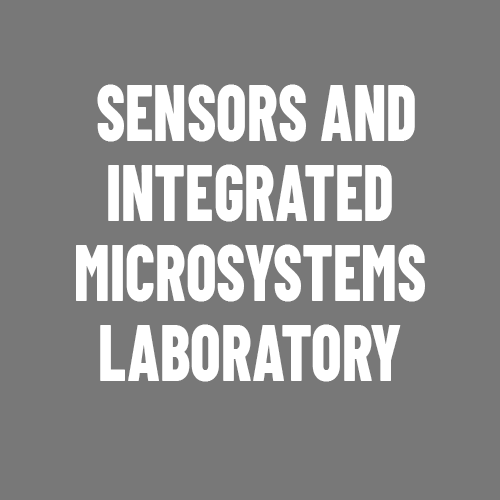
The Sensors and Integrated Microsystems Laboratory (SIMSLab) was established by Patricia M. Nieva at the University of Waterloo in 2006. SIMSLab uses a cross disciplinary approach to develop exciting new sensing solutions for use in real world applications while exploring the fundamentals of science to further the understanding of its researchers and the community. With this comes a wide spectrum of exciting research projects explored in the laboratory.
Key Research Topics: Electric vehicle sensors, biomicro-electromechanical systems (BioMEMS) sensors, harsh environments, micro-electromechanical systems (MEMS) reliability, micro-electromechanical systems (MEMS) phononics
Contact: Patricia M. Nieva, Professor, Lab Director
Structural Biomechanics Lab

Our research program is dedicated to unraveling the mysteries of how biological structures, from bones to tissues to the function of whole systems, respond to mechanical behaviors within a living body. Through a multidisciplinary approach, we integrate principles of structural engineering with the intricacies of biomechanics to gain insights into the mechanical behavior of biological systems. Our research spans a wide spectrum, encompassing the analysis of skeletal structures under various loading conditions, the development of advanced computational models, and the exploration of innovative materials for medical applications. We strive to push the boundaries of knowledge in order to contribute to advancements in medical treatments, patient rehabilitation, orthopedic devices, prosthetics, and complex injury causative biomechanical tasks in hopes of an improved understanding of the mechanical principles governing living organisms.
Key Research Topics:Orthopaedic Biomechanics, Biomedical Devices, Prosthetics & Bracing, Biomechanical Injury Studies, Rehabilitation
Contact: Naveen Chandrashekar, Associate Professor
Website: Structural Biomechanics Lab
Turbulent Combustion Modeling Lab

The Turbulent Combustion Modeling Lab research activities focus on the multi-engineering facets of turbulent combustion modeling found in many industrial applications ranging from aero and automotive engines to furnaces to fire safety. We are interested in developing high fidelity multiscale turbulent fluid flow-combustion simulation tools as well as tackling shorter-term challenging industrial problems.
Key Research Topics: Turbulent combustion in aerospace, turbulent combustion in power generation, Turbulent combustion in the automotive industry, emerging clean combustion technologies, Oxyfuel combustion and carbon storage, Residential heating, House and industrial fire risks
Contact: Cecile Devaud, Lab Director, Professor
UW Fluid Flow Physics Group

The current research projects in the UW Fluid Flow Physics group span a diverse range of topics relevant to fluid mechanics, from modeling flow in a curved tube to harvesting energy from small scale fluid structures.
Key Research Topics: Laminar flow in a curved tube with an implanted stent model, ionic polymer metal composites (IPMCs) as biomimetic propulsors, energy harvesting from small-scale fluid structures, vocal fold model development.
Contact: Sean D. Peterson, Director of the lab, Associate Professor
Vibrations and Energy Harvesting Laboratory

The Vibrations and Energy Harvesting Laboratory at the University of Waterloo is involved in numerous research activities using cutting edge technologies such as vibrations, modal analysis, shape control and dynamics of inflatable gossamer space structures, vibrations energy harvesting solutions using smart materials and hybrid solutions, smart materials solutions for actuation and sensing for physiological applications, noise and acoustics abatement for manufacturing facilities for ergonomics improvement and GNSS reflectometry for quadcopters and remote soil and ice sensing. There is over $1 million of equipment in this lab, including LMS data acquisition systems, B&K acoustics DAQ, shaker, laser vibrometer and several kinds of smart materials.
Key Research Topics: Dynamics, vibrations, acoustics, energy harvesting and GNSS reflectometry
Contact: Armaghan Salehian, Associate Professor, Lab Director
Waterloo Microfluidics Laboratory (WML)

The ultimate goal of WML is to advance the fundamental understanding of microfluidics and nanofluidics and develop chip-based technology for life science research, soft robots for leisure and medical applications, environmental monitoring and disease diagnosis. Specifically, Waterloo Microfluidics Lab is interested in the development of design and optimization tools, advanced microfabrication techniques for rapid prototyping, and characterization methodologies for Lab-on-a-Chip or BioChip devices. Both experimental investigation and numerical simulation are practical tools for their investigations. Driven by the interdisciplinary nature of microfluidics, it often results in innovations that are impactful and have commercial potential. With Waterloo’s unique inventor-own IP policy, entrepreneurship training is also emphasized at WML. Past co-founded companies: Advanced Electrophoresis Solutions; QuantWave Technologies; and Air Microfluidics Systems.
Key Research Topics: Research in WML focuses on the development of microfluidic innovations for: Protein Fractionation, COVID-19 Virus Detection, Water Quality Control, and Soft Robots towards Leisure and Medical Treatment.
Contact: Carolyn Ren, Lab Director, Professor
Waterloo Centre for Automotive Research (WatCAR)

The Waterloo Centre for Automotive Research (WatCAR) focuses on collaborative research in automotive and transportation systems, by facilitating relations between those within the automotive industry and University of Waterloo faculty researchers. WatCAR also participates in connecting undergraduate students with co-op work placements and graduate students with internships. WatCAR envisions future mobility to be smarter, cleaner and more convenient; available to an increasingly wider segment of society.
Key Research Topics: Connectivity, cybersecurity, advanced powertrains, artificial intelligence, autonomous driving, and structural light weighting.
Contact: See Website
Wind Energy Research Lab
The Wind Energy group at the University of Waterloo focuses on wind turbine aerodynamics and aeroacoustics (noise). For any wind energy development, the first requirement is an assessment of the wind resource or how much energy is in the wind at that location. Second, once the resource is estimated, a turbine needs to be built to convert the energy of the wind into valuable electricity. Many factors affect the development of a wind project including any potential effects of acoustic emissions.
Key Research Topics: Wind Energy, wind turbines, large grid-connected wind turbines, Off-grid hybrid wind systems for remote communities
Contact: See Website